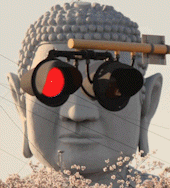 [/floatl]The arrest of "idol" Asuka Sawamoto may well have been part of a broader crackdown in Akihabara. On Sundays, the main road is closed to traffic and Sawamoto's exhibionist display was one of many impromptu performances which draw crowds - in particular groups of photographers who mainly try to get pictures of girl's underwear. Last Sunday, however, a volunteer group of shopkeepers and residents took to the streets in a large scale effort to deter these attractions. According to the Asahi (Japanese), they had an effect as girls in maid and schoolgirl outfits kept away which meant the number of performers on the streets was markedly lower than usual. The patrols will continue in force over Golden Week.
[/floatl]The arrest of "idol" Asuka Sawamoto may well have been part of a broader crackdown in Akihabara. On Sundays, the main road is closed to traffic and Sawamoto's exhibionist display was one of many impromptu performances which draw crowds - in particular groups of photographers who mainly try to get pictures of girl's underwear. Last Sunday, however, a volunteer group of shopkeepers and residents took to the streets in a large scale effort to deter these attractions. According to the Asahi (Japanese), they had an effect as girls in maid and schoolgirl outfits kept away which meant the number of performers on the streets was markedly lower than usual. The patrols will continue in force over Golden Week.| Hot Topics | |
|---|---|
Akihabara Crackdown
9 posts
• Page 1 of 1
Akihabara Crackdown
[floatl] [/floatl]The arrest of "idol" Asuka Sawamoto may well have been part of a broader crackdown in Akihabara. On Sundays, the main road is closed to traffic and Sawamoto's exhibionist display was one of many impromptu performances which draw crowds - in particular groups of photographers who mainly try to get pictures of girl's underwear. Last Sunday, however, a volunteer group of shopkeepers and residents took to the streets in a large scale effort to deter these attractions. According to the Asahi (Japanese), they had an effect as girls in maid and schoolgirl outfits kept away which meant the number of performers on the streets was markedly lower than usual. The patrols will continue in force over Golden Week.
[/floatl]The arrest of "idol" Asuka Sawamoto may well have been part of a broader crackdown in Akihabara. On Sundays, the main road is closed to traffic and Sawamoto's exhibionist display was one of many impromptu performances which draw crowds - in particular groups of photographers who mainly try to get pictures of girl's underwear. Last Sunday, however, a volunteer group of shopkeepers and residents took to the streets in a large scale effort to deter these attractions. According to the Asahi (Japanese), they had an effect as girls in maid and schoolgirl outfits kept away which meant the number of performers on the streets was markedly lower than usual. The patrols will continue in force over Golden Week.
 [/floatl]The arrest of "idol" Asuka Sawamoto may well have been part of a broader crackdown in Akihabara. On Sundays, the main road is closed to traffic and Sawamoto's exhibionist display was one of many impromptu performances which draw crowds - in particular groups of photographers who mainly try to get pictures of girl's underwear. Last Sunday, however, a volunteer group of shopkeepers and residents took to the streets in a large scale effort to deter these attractions. According to the Asahi (Japanese), they had an effect as girls in maid and schoolgirl outfits kept away which meant the number of performers on the streets was markedly lower than usual. The patrols will continue in force over Golden Week.
[/floatl]The arrest of "idol" Asuka Sawamoto may well have been part of a broader crackdown in Akihabara. On Sundays, the main road is closed to traffic and Sawamoto's exhibionist display was one of many impromptu performances which draw crowds - in particular groups of photographers who mainly try to get pictures of girl's underwear. Last Sunday, however, a volunteer group of shopkeepers and residents took to the streets in a large scale effort to deter these attractions. According to the Asahi (Japanese), they had an effect as girls in maid and schoolgirl outfits kept away which meant the number of performers on the streets was markedly lower than usual. The patrols will continue in force over Golden Week.-

Mulboyne - Posts: 18608
- Joined: Thu May 06, 2004 1:39 pm
- Location: London
Mulboyne wrote:The patrols will continue in force over Golden Week.
Well there go my plans for Golden Week!
[font="Arial Black"][SIZE="7"]B[/SIZE][/font][font="Palatino Linotype"][SIZE="6"]u[/SIZE][/font][font="Comic Sans MS"][SIZE="5"]c[/SIZE][/font][font="Impact"][SIZE="6"]k[/SIZE][/font]
-

Bucky - Maezumo
- Posts: 1806
- Joined: Sat Dec 30, 2006 3:20 am
- Location: Left Coast
Mulboyne wrote:Here's another idea:
so thats what my roommate did with the bathroom after i left!
EDIT: oh.. no cigarettes, must not be his.
"When robbery is done in open daylight by sanction of the law, as it is done today, then any act of honor or restitution has to be hidden underground." -Ayn Rand 'Atlas Shrugged'
-

Visitor K - Maezumo
- Posts: 428
- Joined: Tue Feb 08, 2005 10:51 am
- Location: bucharest, romania
Oh nooooos!
What will the freakaziods do!

http://akibahobby.net/2008/04/colonel_maid_akiba.html
 Click to view video.
Click to view video.
What will the freakaziods do!

http://akibahobby.net/2008/04/colonel_maid_akiba.html
 Click to view video.
Click to view video._________
FUCK THE 2020 OLYMPICS!
FUCK THE 2020 OLYMPICS!
-

Taro Toporific - Posts: 10021532
- Images: 0
- Joined: Tue Sep 10, 2002 2:02 pm
Mulboyne wrote:Here's another idea:
My Gawd! You broke into Take's bathroom?
"There are those that learn by reading. Then a few who learn by observation. The rest have to piss on an electric fence and find out for themselves!"- Will Rogers

-

Greji - Posts: 14357
- Joined: Fri Jun 25, 2004 3:00 pm
- Location: Yoshiwara
Yomiuri: Akihabara's street shows halted
Local volunteers have joined police officers on patrols of areas of Akihabara, Tokyo, in a crackdown on people who wear "cosplay" (costume play) fashions and put on live, often provocative, street performances. According to the volunteers, the street performances have become a nuisance recently, inconveniencing shoppers and nearby businesses. A young woman was arrested last month for a performance that drew a large crowd to whom she deliberately exposed her underwear. Can the quarter, famous for its electronics shops, return to being a shopping area where people can feel comfortable and enjoy shopping? This reporter joined a neighborhood patrol to find out. A large pedestrian-only area is created around JR Akihabara Station on Sundays and holidays by temporarily closing some of the streets to vehicles. On April 27, soon after our patrol started, I saw a man wearing a light blue schoolgirl uniform being asked by the police to stop a performance he was giving in the vehicle-free zone. "Why can't we perform here?" the man asked. Hearing the exchange, passersby began gathering at the site, many thinking the dispute also was a performance. The man, a 28-year-old from Kita Ward, Tokyo, said he was imitating a famous anime character. "Some people come here just to see us perform," the man said. "It would be meaningless to put on such a show somewhere other than Akihabara," he added. The patrol was conducted on that day by 120 people including volunteers from local merchants' and neighborhood associations, Chiyoda Ward Office officials and officers from Manseibashi Police Station. They carried signs that read, "Do not engage in street performances." The patrol members warned street performers that their behavior violated the Road Traffic Law because it obstructed the flow of other pedestrians.
Akihabara's streets have been traffic-free on select days since 1973, but in recent years, performances there have become increasingly outrageous. On April 25, a woman who describes herself as a glamour model was arrested on suspicion of violating the Tokyo metropolitan government's public nuisance ordinance when she exposed her underwear for an extended time. She was held for one day. The Chiyoda Ward Office and Manseibashi Police Station have received complaints from some shoppers who have pointed out that they could not take their children with them to shop in Akihabara and that crowds attracted by the live shows obstruct the flow of pedestrians. The ward and police said the number of complaints had been increasing in recent years. Kazushi Ono, president of electronics store Onoden Co., expressed concern about the situation, saying: "If Akihabara comes to be seen as a lawless zone by the public, people would hesitate to come to Akihabara for shopping." "We want to cherish the culture of Akihabara, including costume play, but it's necessary for performers to stick to the rules," said Ono, who also serves as head of the Akihabara Electrical Town Organization, which comprises electronics stores in Akihabara. The patrol was conducted during the Golden Week holidays, and led to a dramatic decrease in the number of performances by people dressed as cartoon characters. The patrols are scheduled to continue in the coming weeks. However, an official of the ward office who is in charge of the patrols said: "It's very difficult to conduct the patrol for an extended period, because they require a lot of people. But we believe the patrols will change the way people think about Akihabara."
Several traffic-free zones have been abolished in Tokyo after they were opposed by people who lived and worked near them. An area in Harajuku, Shibuya Ward, became known as the place where Takenoko-zoku--dance groups active in the 1970s to early 1980s that wore colorful clothes and danced in a distinctive style--was born. Many bands performed there, which contributed to the exploding popularity of pop music and rock music in Japan. However, the zone was abolished in 1998, after local people became fed up with continuing problems related to the scene, such as litter and excessive noise. Writer Tetsuhito Fujiyama has been visiting Akihabara for more than 30 years and published a book "Moeru Seichi Akiba" (Akihabara, the holy place for nerds). "Initially, Akihabara's traffic-free zone was a place where families could shop for home appliances without being disturbed," he said. "Those performers need to understand that extreme performances draw hostility from local people," Fujiyama added. "If they continue with such performances they're digging their own graves."
-

Mulboyne - Posts: 18608
- Joined: Thu May 06, 2004 1:39 pm
- Location: London
-

Taro Toporific - Posts: 10021532
- Images: 0
- Joined: Tue Sep 10, 2002 2:02 pm
Mulboyne wrote:[floatl][/floatl]The arrest of "idol" Asuka Sawamoto may well have been part of a broader crackdown in Akihabara. On Sundays, the main road is closed to traffic and Sawamoto's exhibionist display was one of many impromptu performances which draw crowds - in particular groups of photographers who mainly try to get pictures of girl's underwear. Last Sunday, however, a volunteer group of shopkeepers and residents took to the streets in a large scale effort to deter these attractions. According to the Asahi (Japanese), they had an effect as girls in maid and schoolgirl outfits kept away which meant the number of performers on the streets was markedly lower than usual. The patrols will continue in force over Golden Week.
I wonder how that will effect their bottom lines.
I will not abide ignorant intolerance just for the sake of getting along.
-

American Oyaji - Posts: 6540
- Images: 0
- Joined: Sun Oct 20, 2002 9:20 pm
- Location: The Evidence of Things Unseen
9 posts
• Page 1 of 1
Who is online
Users browsing this forum: No registered users and 8 guests





